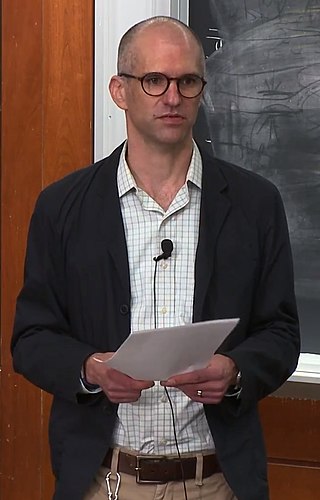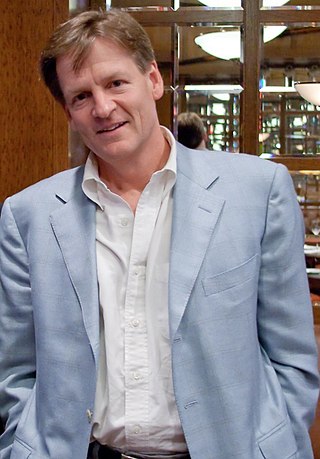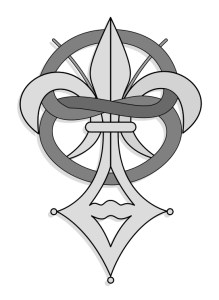
Daniel Gerhard Brown is an American author best known for his thriller novels, including the Robert Langdon novels Angels & Demons (2000), The Da Vinci Code (2003), The Lost Symbol (2009), Inferno (2013), and Origin (2017). His novels are treasure hunts that usually take place over a period of 24 hours. They feature recurring themes of cryptography, art, and conspiracy theories. His books have been translated into 57 languages and, as of 2012, have sold over 200 million copies. Three of them, Angels & Demons, The Da Vinci Code, and Inferno, have been adapted into films, while one of them, The Lost Symbol, was adapted into a television show.

The Vitruvian Man is a drawing by the Italian Renaissance artist and scientist Leonardo da Vinci, dated to c. 1490. Inspired by the writings of the ancient Roman architect Vitruvius, the drawing depicts a nude man in two superimposed positions with his arms and legs apart and inscribed in both a circle and square. It was described by the art historian Carmen C. Bambach as "justly ranked among the all-time iconic images of Western civilization". Although not the only known drawing of a man inspired by the writings of Vitruvius, the work is a unique synthesis of artistic and scientific ideals and often considered an archetypal representation of the High Renaissance.

In fiction, a gold key is a special token granting access to and control of a mythical or ultra-private or secret bank account or vault, such as a Swiss bank account. In reality, the key is often a code word and accounts are not completely anonymous. A real "gold key" need not be made of or colored gold, or even a key. If it is a key it may not fit any lock; the keys are important as authentication tokens, not always as literal keys. In the case of the GoldKey Security Token, a USB device developed by a team of developers, the token acts as a physical "key" to electronic data.

Seth Mnookin is an American writer and journalist.

The Da Vinci Code is a 2006 mystery thriller film directed by Ron Howard, written by Akiva Goldsman, and based on Dan Brown's 2003 novel of the same name. The first in the Robert Langdon film series, the film stars Tom Hanks, Audrey Tautou, Ian McKellen, Alfred Molina, Jürgen Prochnow, Jean Reno and Paul Bettany. In the film, Robert Langdon, a professor of religious symbology from Harvard University, is the prime suspect in the grisly and unusual murder of Louvre curator Jacques Saunière. On the body, the police find a disconcerting cipher and start an investigation. Langdon escapes with the assistance of police cryptologist Sophie Neveu, and they begin a quest for the legendary Holy Grail. A noted British Grail historian, Sir Leigh Teabing, tells them that the actual Holy Grail is explicitly encoded in Leonardo da Vinci's wall painting, The Last Supper. Also searching for the Grail is a secret cabal within Opus Dei, an actual prelature of the Holy See, who wish to keep the true Grail a secret to prevent the destruction of Christianity.
Lynn Picknett is an English writer of books that are mainly about religious history and popular conspiracy theories, the paranormal, the occult, and historical mysteries.

Michael Monroe Lewis is an American author and financial journalist. He has also been a contributing editor to Vanity Fair since 2009, writing mostly on business, finance, and economics. He is known for his nonfiction work, particularly his coverage of financial crises and behavioral finance.
Michael Baigent was a New Zealand writer who published a number of popular works questioning traditional perceptions of history and the life of Jesus. He is known best as a co-author of the book The Holy Blood and the Holy Grail.
The Da Vinci Code, a popular suspense novel by Dan Brown, generated criticism and controversy after its publication in 2003. Many of the complaints centered on the book's speculations and misrepresentations of core aspects of Christianity and the history of the Catholic Church. Additional criticisms were directed toward the book's inaccurate descriptions of European art, history, architecture, and geography.
Richard Harris Leigh was a novelist and short story writer born in New Jersey, United States to a British father and an American mother, who spent most of his life in the UK. Leigh earned a BA from Tufts University, a master's degree from the University of Chicago, and a PhD from the State University of New York at Stony Brook.

The Jesus Papers: Exposing the Greatest Cover-Up in History is a book by author Michael Baigent published in 2006. Providing his detailed history of Jesus' life and crucifixion, using papers that were covered up, the book documents the political context of Jesus' birth and then goes on to examine the history of the migration of the family of Jesus, the chronicles of his teachings, and his death. The book was published on the same day that The Da Vinci Code by Dan Brown became available as a paperback in the US.

The Da Vinci Code is a 2006 adventure puzzle video game developed by The Collective and published by 2K for PlayStation 2, Xbox and Microsoft Windows. Although the game was released on the same day that the film of the same name opened in theaters, it is based directly on the 2003 novel by Dan Brown rather than the film. As such, the characters in the game do not resemble nor sound like their filmic counterparts.

The Da Vinci Code is a 2003 mystery thriller novel by Dan Brown. It is Brown's second novel to include the character Robert Langdon: the first was his 2000 novel Angels & Demons. The Da Vinci Code follows symbologist Langdon and cryptologist Sophie Neveu after a murder in the Louvre Museum in Paris entangles them in a dispute between the Priory of Sion and Opus Dei over the possibility of Jesus and Mary Magdalene having had a child together.
The Jesus bloodline refers to the proposition that a lineal sequence of the historical Jesus has persisted, possibly to the present time.

Lee Goldberg is an American author, screenwriter, publisher and producer known for his bestselling novels Lost Hills and True Fiction and his work on a wide variety of TV crime series, including Diagnosis: Murder, A Nero Wolfe Mystery, Hunter, Spenser: For Hire, Martial Law, She-Wolf of London, SeaQuest, 1-800-Missing, The Glades and Monk.
Amy Welborn is an American Roman Catholic writer and activist, as well as a public speaker. Formerly, she was a theology teacher at a Catholic high school in Lakeland Florida and served as a parish Director of Religious Education. She was a columnist for Our Sunday Visitor. as well as for Catholic News Service.
Carl E. Olson is an American theologian, a Christian apologist and non-fiction author.

The Prieuré de Sion, translated as Priory of Sion, was a fraternal organisation founded and dissolved in France in 1956 by Pierre Plantard in his failed attempt to create a prestigious neo-chivalric order. In the 1960s, Plantard began claiming that his self-styled order was the latest front for a secret society founded by crusading knight Godfrey of Bouillon, on Mount Zion in the Kingdom of Jerusalem in 1099, under the guise of the historical monastic order of the Abbey of Our Lady of Mount Zion. As a framework for his grandiose assertion of being both the Great Monarch prophesied by Nostradamus and a Merovingian pretender, Plantard further claimed the Priory of Sion was engaged in a centuries-long benevolent conspiracy to install a secret bloodline of the Merovingian dynasty on the thrones of France and the rest of Europe. To Plantard's surprise, all of his claims were fused with the notion of a Jesus bloodline and popularised by the authors of the 1982 speculative nonfiction book The Holy Blood and the Holy Grail, whose conclusions would later be borrowed by Dan Brown for his 2003 mystery thriller novel The Da Vinci Code.
Henry Soskin, better known as Henry Lincoln, was a British author, television presenter, scriptwriter, and actor. He co-wrote three Doctor Who multi-part serials in the 1960s, and — starting in the 1970s — inspired three Chronicle BBC Two documentaries on the alleged mysteries surrounding the French village of Rennes-le-Château — and, from the 1980s, co-authored and authored a series of books of which The Holy Blood and the Holy Grail was the most popular, becoming the inspiration for Dan Brown's 2003 best-selling novel, The Da Vinci Code. He was the last living person to have written for Doctor Who in the 1960s.

The Holy Blood and the Holy Grail is a book by Michael Baigent, Richard Leigh, and Henry Lincoln.












